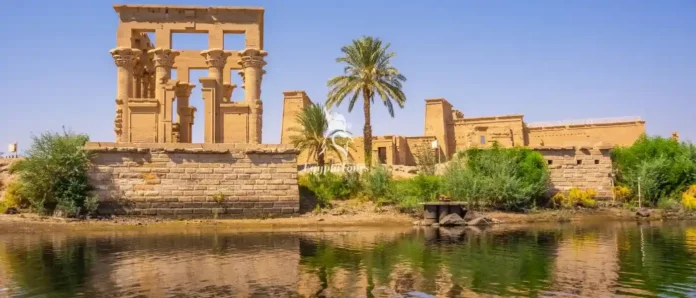The stretch between Luxor and Aswan is a treasure trove of ancient wonders. Along this iconic river, monumental structures built thousands of years ago still stand tall, whispering the stories of Egypt’s rich heritage. Traveling here is more than sightseeing—it’s an immersion into the world of pharaohs, gods, and timeless architecture.
Whether you’re seeking grandeur, hidden gems, or sacred history, each site offers something unique. Below are the must-visit locations that will transform your journey into an unforgettable adventure.
Key Points
- Luxor and Aswan hold some of Egypt’s most iconic landmarks.
- Discover sacred sites along the river.
- Travel tips for exploring Egypt’s heritage.
1. Karnak Temple Complex – An Unrivaled Marvel
Karnak is an overwhelming introduction to Egypt’s grandeur. Its massive columns, intricate carvings, and sacred lake make it one of the most impressive sites in the world. As you walk through its monumental entrance, the sense of history is palpable. Each section of the complex tells stories of different pharaohs who contributed to its construction.
Travel Tip: Visit early morning or late afternoon to avoid crowds and harsh sunlight. Hiring a knowledgeable guide will enhance your visit with fascinating stories about the temple’s history.
2. Luxor Temple – A Fusion of Ancient Religions
Unlike Karnak, which was a sacred complex, Luxor Temple served as a living sanctuary. Located in the heart of Luxor, this site is an architectural masterpiece. Built by Amenhotep III and Ramses II, it features majestic statues, towering columns, and remnants of later Roman influence.
During the evening, the site transforms under soft lighting, creating a magical atmosphere.
3. Medinet Habu – A Hidden Gem
Often overshadowed by its larger neighbors, Medinet Habu offers a quieter yet equally mesmerizing experience. This mortuary temple of Ramses III boasts vividly preserved reliefs depicting battles, rituals, and daily life.
Visitors often describe Medinet Habu as one of the most serene places in Luxor. It’s the perfect spot for travelers seeking history without the hustle of larger tourist sites.
4. Temple of Hatshepsut – A Monument to a Trailblazer
Hatshepsut’s mortuary temple is a testament to the legacy of Egypt’s first female pharaoh. Built into the cliffs of Deir el-Bahari, its terraces and statues make it a striking sight. The stories of her reign, depicted in stunning reliefs, add a human touch to its grandeur.
Tip for Families: The wide-open spaces and fascinating stories make it a family-friendly stop. Kids can enjoy exploring without feeling confined.
5. Nile Cruise – A Luxurious Way to Explore
For travelers seeking an elegant and immersive experience, the Dahabiya Nile Cruise is an unparalleled choice. This boutique vessel, named after Queen Farida, combines the charm of a traditional sailing boat with modern luxury.
While cruising the river, you’ll enjoy the slow rhythm of Egypt’s landscape, passing villages and ruins at a pace that allows you to truly appreciate your surroundings. The cruise is ideal for visiting some temples while ensuring comfort and privacy after a day of exploration.
6. Temple of Edfu – Preserved Glory of Horus
Located midway between Luxor and Aswan, the Temple of Edfu is one of the most intact sites along the river. Dedicated to the falcon god Horus, it offers a vivid glimpse into Ptolemaic architecture. The massive pylon entrance is a breathtaking sight, and the intricate hieroglyphs reveal tales of ancient rituals.
7. Kom Ombo – A Double Dedication
Kom Ombo stands out for its unique design. Dedicated to two gods—Sobek, the crocodile god, and Horus—it offers dual sanctuaries. The site’s location along the riverbank adds to its allure, especially at sunset when the surroundings glow with golden hues.
Highlight: Don’t miss the crocodile mummies displayed in the on-site museum.
8. Philae Temple – An Island Wonder
Philae Temple, dedicated to the goddess Isis, is an enchanting experience. Its unique setting on Agilkia Island requires a short boat ride, adding to its charm. The temple’s relocation during the Aswan High Dam project saved it from submersion and preserved its rich history for future generations.
Travel Advice: Plan your visit early in the morning for peaceful exploration, or attend the evening light show for a dramatic retelling of the temple’s story.
9. Abu Simbel – A Jaw-Dropping Experience
Few places compare to the sheer scale and artistry of Abu Simbel. Carved into a mountainside, the two colossal temples of Ramses II and Nefertari stand as monuments to love, power, and divine reverence.
Visitors are often awestruck by the precision with which the entire complex was relocated to prevent flooding during the Aswan Dam’s construction.
Tips from one traveler to another:
- Book tickets early, as Abu Simbel attracts crowds.
- Combine your visit with an early morning drive to catch the sunrise.
10. Esna Temple – A Quiet Discovery
Esna is often overlooked, but its charm lies in its intimate scale and vivid decorations. As you step inside, the colorful reliefs tell stories of the cosmos and Egyptian deities. Its location in the heart of Esna town makes it a convenient stop for those cruising the river.
Best Times to Visit
Timing matters when exploring Egypt’s heritage. The cooler months from October to April are ideal for sightseeing, as the heat can be intense during summer. Mornings and evenings are the best times to visit, offering pleasant temperatures and fewer crowds.
Packing Essentials for a Comfortable Journey
- Light Clothing: Choose breathable fabrics to stay cool.
- Sturdy Footwear: Many sites involve walking on uneven terrain.
- Sunscreen and Hat: Protect yourself from the strong sun.
- Reusable Water Bottle: Stay hydrated during long excursions.
Hidden Gems Along the Way
- Deir el-Medina: A workers’ village with detailed tombs.
- Nubian Villages: Experience local culture and traditions.
- Elephantine Island: A serene spot with archaeological significance.
Conclusion
Exploring the sacred sites between Luxor and Aswan is an experience unlike any other. Each destination offers a glimpse into the grandeur of ancient Egypt, balanced with moments of serene beauty along the river. Whether you’re marveling at Karnak, taking in the views on a Nile Cruise, or uncovering lesser-known stops, your journey will be filled with wonder and unforgettable memories.
Plan wisely, stay curious, and let the magic of Egypt guide your adventure!







